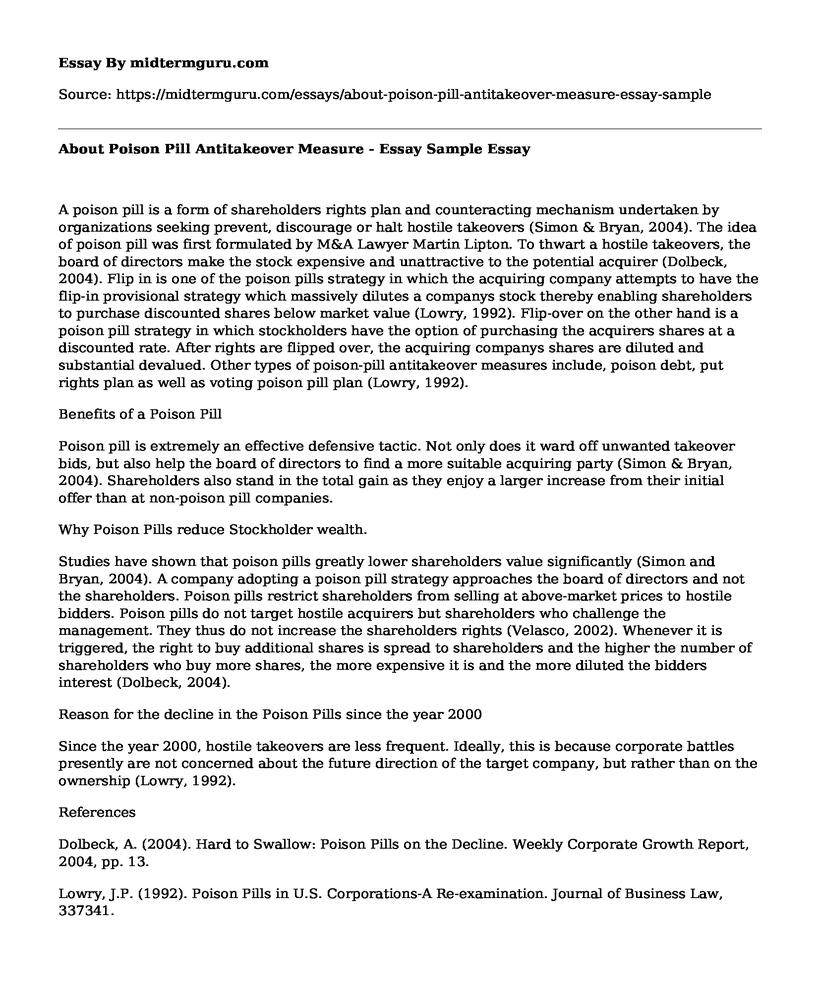A poison pill is a form of shareholders rights plan and counteracting mechanism undertaken by organizations seeking prevent, discourage or halt hostile takeovers (Simon & Bryan, 2004). The idea of poison pill was first formulated by M&A Lawyer Martin Lipton. To thwart a hostile takeovers, the board of directors make the stock expensive and unattractive to the potential acquirer (Dolbeck, 2004). Flip in is one of the poison pills strategy in which the acquiring company attempts to have the flip-in provisional strategy which massively dilutes a companys stock thereby enabling shareholders to purchase discounted shares below market value (Lowry, 1992). Flip-over on the other hand is a poison pill strategy in which stockholders have the option of purchasing the acquirers shares at a discounted rate. After rights are flipped over, the acquiring companys shares are diluted and substantial devalued. Other types of poison-pill antitakeover measures include, poison debt, put rights plan as well as voting poison pill plan (Lowry, 1992).
Benefits of a Poison Pill
Poison pill is extremely an effective defensive tactic. Not only does it ward off unwanted takeover bids, but also help the board of directors to find a more suitable acquiring party (Simon & Bryan, 2004). Shareholders also stand in the total gain as they enjoy a larger increase from their initial offer than at non-poison pill companies.
Why Poison Pills reduce Stockholder wealth.
Studies have shown that poison pills greatly lower shareholders value significantly (Simon and Bryan, 2004). A company adopting a poison pill strategy approaches the board of directors and not the shareholders. Poison pills restrict shareholders from selling at above-market prices to hostile bidders. Poison pills do not target hostile acquirers but shareholders who challenge the management. They thus do not increase the shareholders rights (Velasco, 2002). Whenever it is triggered, the right to buy additional shares is spread to shareholders and the higher the number of shareholders who buy more shares, the more expensive it is and the more diluted the bidders interest (Dolbeck, 2004).
Reason for the decline in the Poison Pills since the year 2000
Since the year 2000, hostile takeovers are less frequent. Ideally, this is because corporate battles presently are not concerned about the future direction of the target company, but rather than on the ownership (Lowry, 1992).
References
Dolbeck, A. (2004). Hard to Swallow: Poison Pills on the Decline. Weekly Corporate Growth Report, 2004, pp. 13.
Lowry, J.P. (1992). Poison Pills in U.S. Corporations-A Re-examination. Journal of Business Law, 337341.
Simon, C.E., and Bryan, J.M. (2004). Corporate Anti-Takeover Defenses: The Poison Pill Device. St. Paul, MN: Thomson West.
Velasco, J. (2002). The Enduring Illegitimacy of the Poison Pill. Journal of Corporation Law, 27 (3), pp. 381423.
Cite this page
About Poison Pill Antitakeover Measure - Essay Sample. (2021, Jul 02). Retrieved from https://midtermguru.com/essays/about-poison-pill-antitakeover-measure-essay-sample
If you are the original author of this essay and no longer wish to have it published on the midtermguru.com website, please click below to request its removal:
- Report on Canyon Creek Food Company Ltd
- Paper Example on International Financial And Banking
- Important Factors You Need to Know Before Investment - Essay Sample
- Paper Example on Investment Restrictions
- Research Paper on Classical Exchange-Traded Funds
- Internet Banking - Essay Sample
- South Africa Reserve Bank: Maintaining Economic Stability & Positive Culture - Essay Sample







